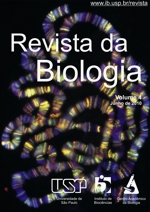Thermal influence on gene expression regulation and its action in the dynamics of cell membranes
DOI:
https://doi.org/10.11606/issn.1984-5154.v4p6-9Keywords:
Desaturases, Fatty acids, Gene expression.Abstract
The human influence on natural systems has been steadily increased, justifying the importance to investigate the antropic factors that cause stress in animals in their natural systems. In the aquatic environment the human actions are very evident, leading the organisms sometimes to be exposed to sub lethal effects that can cause unpredictable consequences. Variations in temperature affect the structure of cell membranes and can compromise the enzymatic activity associated with the membranes and the transport processes. In this sense, this assay postulates some hypothesis about the possible role of temperature on structural changes of cell membranes.
Downloads
References
Andrade, V. X. L., Moreira, R.G.,Schreiner, M., Scorvo Filho, J. D., Romagosa, E. Influência da dieta no crescimento e na composição dos ácidos graxos de fêmeas de pintado, Pseudoplatystoma corruscans (Siluriformes: Pimelodidae) criados em tanques-rede. In: Congresso Aquaciência (2006), 2006, Bento Gonçalves (RS). Anais do Congresso Aquaciência 2006. Bento Gonçalves (RS): Aquabio / UFRG.
Buda, C., Dey, I., Balogh, N., Horvath, L.I., Maderspach, K., Juhasz, M., Yeo, Y.K. and Farkas, T. (1994). Structural order of membranes and composition of phospholipids in fish brain cells during thermal acclimatization. Proc. Natl. Acad. Sci. U. S. A. 91, 8234–8238.
Cossins, A.R., Murray, P.A., Gracey, A.Y., Logue, J., Polley, S., Caddick, M., Brooks, S., Postle, T., Maclean, N. (2002). The role of desaturases in cold-induced lipid restructuring. Bioch. Soc. Transac.30,1082-1086.
Evans, T., Tomaso,Quail, J., Rogers, A., Gracey, A. R.,Cossins, and M. Berenbrink. (2008). Ancient and odern duplication events and the evolution of stearoyl-CoA desaturases in teleost fishes. Physiol Genomics. 35, 18-29.
Hazel, J.R. (1984). Effects of temperature on the structure and metabolism of cell membranes in fish. Am. J. Physiol. 246, 460–470.
Hazel, J.R. (1989). Cold adaptation in ectotherms: regulation of membrane function and cellular metabolism. Adv. Comp. Environ. Physiol. 4, 1–50.
Hazel, J.R., Willians, E.E. (1990). The role of alterations in membrane lipid composition in enabling physiological adaptation of organisms to their physical environment. Prog. Lipid Res. 29, 167–227.
Hochachka P. W., Somero, G. N. (2002). Biochemical Adaptation: mechanism and process in physiological evolution. Oxford University Press, New York, 466p.
Hsieh, C.,Kuo.M.(2005). Stearoly-CoA desaturase expression and fatty acid composition in milkfish (Chanos chanos) and grass carp (Ctenopharyngodon idella) during cold acclimation, Comp. Bioch. and Phys. 141, 95–101.
Kates, N., Moldoveanu,M., Stewart, L.C.(1993). On the revised structure of the major phospholipid of Halobacterium salinarium. Biochim. Biophys. Acta .1169, 46–53.
Kraffe, P., Guderley, H. Marty, Y. (2007). Changes in mitochondrial oxidative capacities during thermal acclimation of rainbow trout Oncorhynchus mykiss: roles of membrane proteins, phospholipids and their fatty acid compositions. Journ. Experim. Biol. 210, 149-165.
Lemieux H, Blier, P.U, Tardif, J.C. (2008). Does membrane fatty acid composition modulate mitochondrial functions and their thermal sensitivities? Comp Biochem Physiol . 149, 20-29.
Los, D.A., Murata, N. (1993). The temperature-dependent expression of the desaturase gene desA in Synechocystis PCC6803. FEBS Lett. 318, 57–60.
Los, D.A., Murata, N. (1998). Structure and expression of fatty acid desaturases. Bioch. Bioph. Acta. 1394,3-15.
Los, D.A., Murata, N. (2000). Regulation of enzimatic activity and gene expression by membrane fluidity.Sci. STKE.pe1. DOI:10.1126. 115, 875-879.
Murata, N., Wada, H. (1995). Acyl-lipid desaturases and their importance in the tolerance and acclimatization to cold of cyanobacteria. Biochem. J. 308, 1–8.
Murata, N., Los, D.A., (1997). Membrane fluidity and temperature perception. Plant Physiol.
Pereira, S.L., Leonard, A.E., Mukerji, P.(2003). Recent advances in the study of fatty acid desaturases from animals and lower eukaryotes. Prostagl., Leukotr. and EFA. 68, 97-106.
Podrabsky, J.E., Somero,G.N. (2004). Changes in gene expression associated with acclimation to Constant temperatures and fluctuating daily temperatures in a annual killifish Austrofundulus linnaeus. J. Exper. Biol.207,2237-2254.
Polley, S.D., Tiku, P.E., Trueman, R.T., Caddick,M.X., Morozov I.Y., Cossins, A.R. (2003). Differential expression of cold- and diet-specific genes encoding two carp liver ∆9-acyl-coA desaturase isoforms. Am. J. Physiol. Regul. Integr. Comp. Physiol. 284, R41-R50.
Russel, N.J. (1984). Mechanisms for thermal adaptation in bacteria: blueprint for survival. Trens Biochem. Sci. 9,108-112.
Schulte, P.M. (2004). Changes in gene expression as biochemical adaptation to environmental change: a tribute to Peter Hochachka. Comp. Bioch. Physiol.139,519-529.
Tocher, D. R., Dick, J. R., MacGlaughlin, P., Bell, J. G.(2006). Effect of diets enriched in ∆6 desaturated fatty acids (18:3n-6 and 18:4n-3), on growth, fatty acid composition and highly unsaturated fatty acid synthesis in two populations of Artic charr (Salvelinus alpinus L.).
Comp. Bioch. Physiol. 144,245-253.
Torrengo, M.P., de, and Brenner, R.R. (1976). Influence of environmental temperature on the fatty acid desaturation and elongation activity of fish (Pimelodus maculatus) liver microsomes. Biochim. Biophys. Acta. 424, 36–44.
Trueman, R.J., Tiku, P.E., Caddick, M.X. and Cossins, A.R.(2000). Thermal thresholds of lipid restructuring and delta(9)-desaturase expression in the liver of carp (Cyprinus carpio L.) J. of Exper. Biol. 203, 641-650.
Downloads
Published
Issue
Section
License
Copyright (c) 2010 Cristiéle da Silva Ribeiro

This work is licensed under a Creative Commons Attribution 4.0 International License.
We ensure that our journal does not retain any copyright and that these are exclusive of the author(s) of the text. In that sense, we intend to break any restrictions to the published material and to achieve more intensely our goal of communicating science.






